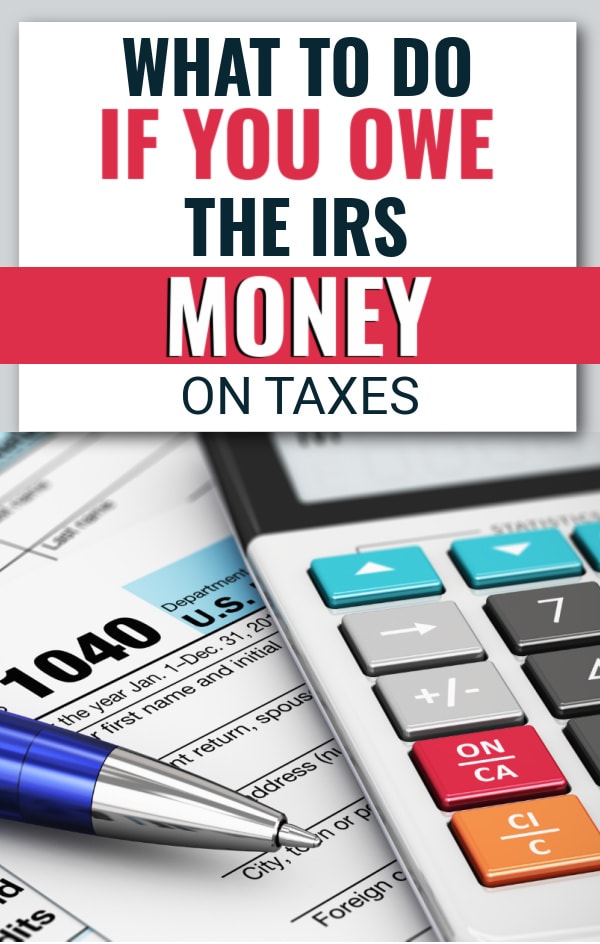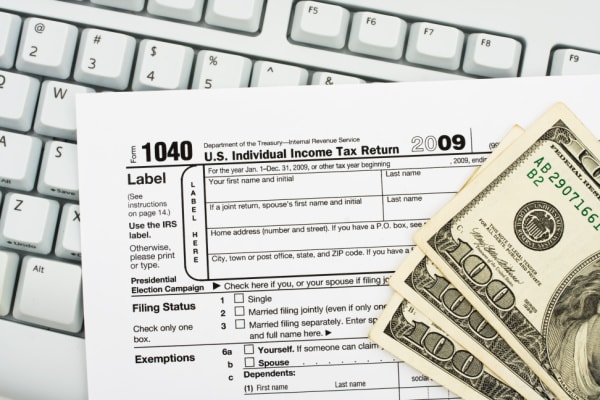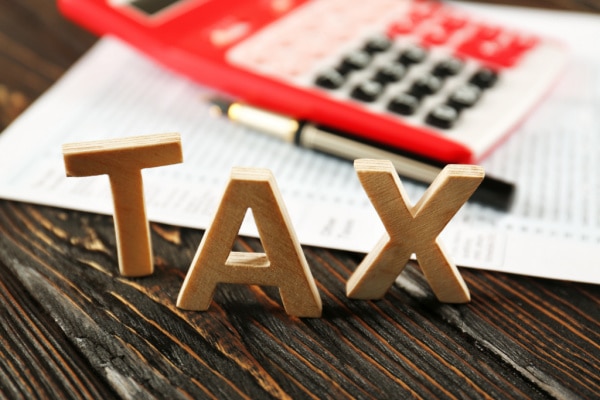This post is sponsored by Community Tax and includes tracking links. For more information and how to opt out, please visit All About Do Not Track prior to clicking any links found in this post.

So, you just finished working on your tax return and you've discovered that you owe the IRS a bunch of money for your taxes this year. And, it's money that you don't already have in savings.
Or perhaps, you received a letter from the Internal Revenue Service that states you made a mistake when you filed your taxes, and you now owe the IRS a lot of money.
What do you do? Is there anything you can do about these unpaid taxes?
File Your Taxes on Time
If you owe money on your tax return and know you can't pay it by the tax filing deadline, still file your tax return on time. The penalties are steep for filing your return late - 5% per month, up to 25%! The penalties for not filing are much higher than the late payment penalties (which are 0.5% per month, up to 25%).
Don't Ignore the Bill
Paying your federal taxes is not one of those things that you can pretend didn't happen and just ignore and hope it all goes away. You have to take action even if you can't pay your bill.
If you do happen to ignore your tax obligation, you will receive communication from the IRS, including a CP501 and CP502 Notice. These letters are a reminder that you owe taxes to the federal government, and you need to either pay the amount owed or dispute it. The letter will include the total amount owed plus any interest and penalties in the balance and ask you to pay your tax bill immediately.
If you ignore those first two notices, the IRS will send a CP504 notice, which is your final notice before the IRS starts taking action. They can issue a federal tax lien on any state income tax refunds or any major assets you own (like your home). The lien would then take any profits from the sale of those assets, up to the amount owed. The IRS can also issue levies on your assets and garnish your wages or pull money from your bank accounts.

Don't Assume the IRS is Correct {Consult with a Professional}
It's likely that you're not a tax expert. If you do owe the IRS a large amount of money, it's best to consult with someone who is a tax expert and knows how to deal with the IRS and tax problems - like Community Tax.
Community Tax offers a free tax analysis to discuss the best potential resolutions to your tax liability. They will start the investigation process by filing a Tax Authorization form 8821 with the IRS (or your state taxing authority) to get a complete record of your account.
Then, tax professionals from Community Tax will go over your returns and records and determine whether the IRS is correct or if there is a discrepancy between what you think you owe and what the IRS thinks you owe on your income taxes. Don't just assume the IRS amount is correct without getting tax advice.
From there, Community Tax will help guide you with the best way to address the problem as well as your legal rights, whether it's disputing the bill with the IRS, getting help with tax liens or levies, or helping you set up a plan to pay. They will gather more in-depth information from you so they can prepare an in-depth proposal for submission to the IRS.
The Community Tax team is made up of enrolled agents, CPAs, and tax attorneys with decades of experience. They've helped over 90,000 clients with their tax needs.

If the IRS Bill is Correct, What Can You Do?
Request a Short Term Extension
If you can't pay the full amount of your tax bill, pay as much as you can upfront by the due date and request a short-term extension on payment. You will have 120 days to pay your bill and you won't have to pay a setup fee. Interest and penalties will still accrue on the unpaid balance.
Set up an Installment Agreement
After paying as much as you can, if you think that 120 days is not enough to pay the rest of the balance, you can set up an installment agreement (which is basically a monthly payment plan). You must owe less than $50,000 to set up the agreement, and you must be current on filing all tax returns.
You will have to pay an application fee to set up the installment agreement request (which can be waived for low-income taxpayers), but you can save money on fees by setting up an online payment agreement and by paying with direct pay debit from your bank account.
The balance needs to be paid off in no more than 72 months and within the 10-year statute of limitations period in order for the IRS to accept the installment payment amount. You must continue your payments and file future required returns by the deadline, or you'll be in default and have to pay fees to set up the installment payments agreement again. Any tax refunds that you would have received in future years will be taken and applied to your balance.
Once you have an installment agreement set up, the IRS can't take any additional action against you (although they can file a tax lien for amounts owed more than $10,000), but interest and penalties will continue to accrue on your unpaid tax balance.

Currently Not Collectible Status
If the taxpayer's monthly necessary living expenses (which means food, housing, utilities, transportation, and health care) are more than their monthly income, the IRS will put tax collection on hold due to financial hardship. The IRS won't garnish wages, but penalties and interest will continue to accrue. Plus, they will monitor your financial situation each year when you file your taxes, and if your finances improve, the IRS can cancel the Currently Not Collectible status and put your tax debt back into active collection.
Offer in Compromise
If you truly have no way to pay, you may be able to negotiate to lower your tax bill if the IRS doubts they will ever be able to collect the total amount. They will look at all of your cash and non-cash assets (like bank accounts, retirement savings, real estate, etc.), monthly disposable income, as well as your future income potential.
You must offer to pay at least as much as your net worth, and if the IRS accepts your offer, you have 24 months to pay. You must file all your taxes on time for the next 5 years and pay all taxes due by the tax deadline.
It's best to have an expert, like Community Tax, help you with an Offer in Compromise to make sure you qualify and that it gets done correctly.
Get Penalties Abated
Tax penalties can add up quickly. You can request that the IRS abate your failure to file and failure to pay penalties if you have reasonable cause (a reasonable excuse) or if you have a clean compliance history (filed taxes on time, paid tax bills or arranged for payment on time, and had no prior penalties) for the previous three years. Community Tax will help you request penalty abatement.

How to NOT Pay Your Tax Bill
Don't panic! Take some time to think about how you're going to pay your bill and consult a professional like Community Tax. Don't immediately charge the balance to your credit cards or pull the money out of your retirement funds just to get the IRS out of your life.
The IRS interest rate is lower than credit card rates. Plus, if you use your credit card to pay your tax bill, you will pay a card processing fee of about 2%.
If you pull funds out of retirement savings before you qualify to pay your tax bill, you will also pay a 10% penalty on that money. Plus, retirement funds are meant to be saved and used towards your retirement!
Paying taxes at tax time and dealing with communication from the IRS can be frustrating. But, you can partner with a company like Community Tax to walk you through the process and advocate for you with the IRS.








Leave a Reply